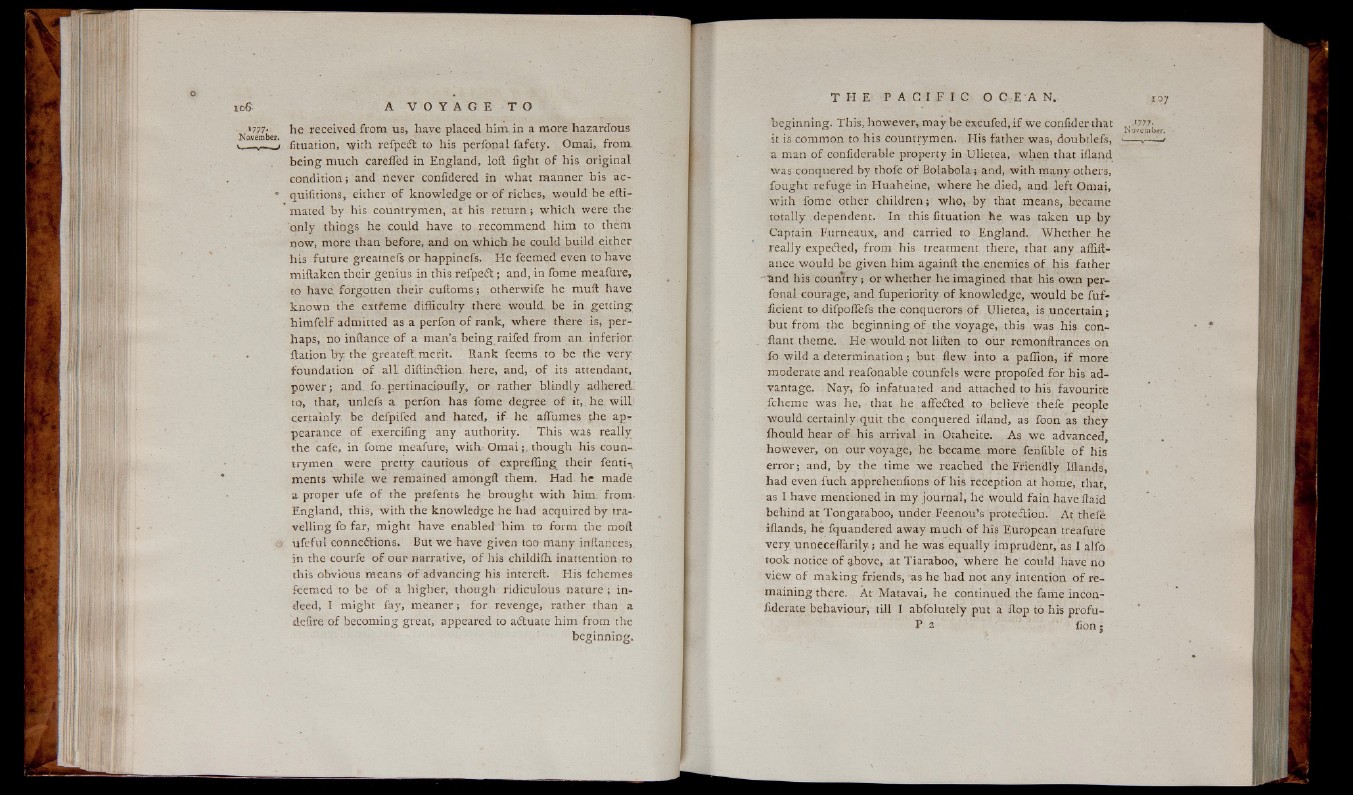
h e received from us, have placed h im in a more hazardous
lituation, ■with refpedt to his perfonal fafety. Omai, from
be in g much carefled in England, loft fight o f his original
con d ition ; and never conildered in what manner his ac-
quifmons, either o f knowledge or o f riches, wou ld be efti—
mated by his countrymen, at his re turn ; w h ich were the
only things he could have to recommend him to them
now, more than before, and on w hich he could build either
his future greatnefs or happinefs. He feemed even to have
miftaken their genius in this refpedt; and, in fome meafure,
to have forgotten their cu ftom s ; otherwife he muft have
kn ow n the extfeme difficulty there would, be in getting;
h im fe lf admitted as a perfon o f rank, where there is, perhaps,
no inftance o f a man’s be in g raifed from an. inferior
ftatjon by the greateft, m erit. Rank feems to be the ve ry
foundation o f a l l diftindiion. here, and, o f its attendant,
p ow e r ; and. fo pertinacioufly, or rather blindly adheredi
to, that, unlefs a. perfon has fome degree o f it,, he w ill
certainly be defpifed and. hated, if- he affumes the appearance
o f exercifing any authority. This was really
the cafe, in fome meafure, with.. O m a i t h o u g h his countrymen
were pretty cautious o f expreffing their fenti-,
ments white, w e remained' amongft them. Had he made
a proper ufe o f the prefents h e brought with him from.
England, this, with the kn owledge he had acquired by trave
llin g fo far, might have enabled him to form the molt
u fe fu l connediions. But we have given too many inftances-,
in the courie o f o u r narrative, o f his childiffi inattention to
this obvious means o f advancing his intereft. His fchemes
feemed to be o f a higher, though ridiculous nature ; indeed,
I might fay, m e an e r ; fo r revenge, rather than a
defire o f becoming great, appeared to actuate h im from the
beginning.
beginning. This, however, may be excufed, i f we confider that
it is common to bis countrymen. His father was, doubtlefs,
a man o f confiderable property in Ulietea, when that ifland
was conquered by thofe o f Bolabola ; and, with many others,
fou gh t re fu g e in Huaheine, where he died, and left Omai,
with fome other ch ild ren ; who, by that means, became
totally dependent. In this fituation he was taken up by
Captain Furneaux, and carried to England. Whether he
rea lly expedled, from his treatment there, that any affift-
ance would be given him againft the enemies o f his father
"Snd his co u n try ; or whether he imagined that his own perfonal
courage, and fuperiority o f knowledge, would be fu f-
ficient to difpoflefs the conquerors o f Ulietea, is un ce rtain ;
but from the beginn in g o f the voyage, this was his con-
ftant theme. He would not liften to our remonftrances on
fo wild a determination; but flew into a paffion, i f more
moderate and reafonable counfels were propofed for his advantage.
Nay, fo infatuated and attached to his favourite
fcheme was he, that he affetfted to believe thefe people
wou ld certainly quit the conquered ifland, as foon as the y
ihould hear o f his arrival in Otaheite. As w e advanced,
however, on our voyage, he became more fenfible o f his
e r ro r ; and, by the time w e reached the Friendly .Iflands,
had even fuch apprehenfions o f his reception at home, that,
as I have mentioned in m y journal, he would fain haveftaid
behind at Tongataboo, under Feenou’s protedlion. At thefé
iflands, he fquandered away much o f his European treafure
v e ry unneceliarily.; and he was equally imprudent, as I alfo
took notice o f above, at Tiaraboo, where he could have no
view o f m a k in g friends, as he had not any intention o f remaining
there. At Matavai, he continued the fame incon-
fiderate behaviour, till I abfolutely put a flop to his profu-
P 2 . . ‘ fion 5
■w-
November.